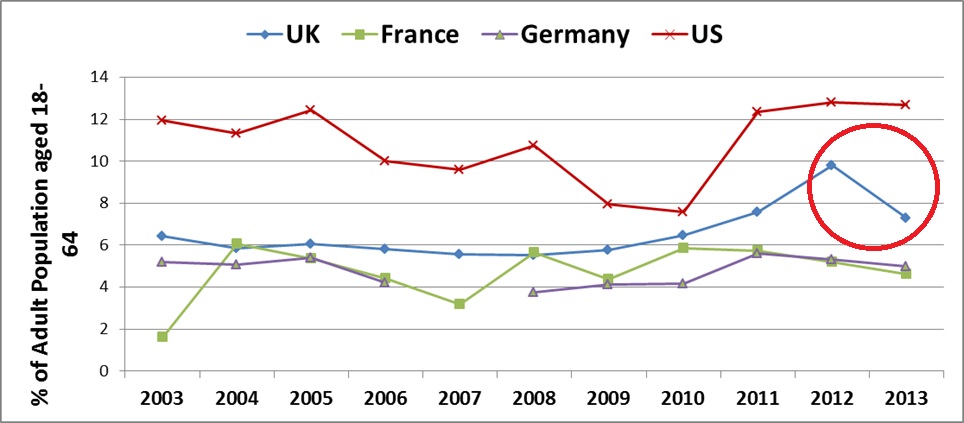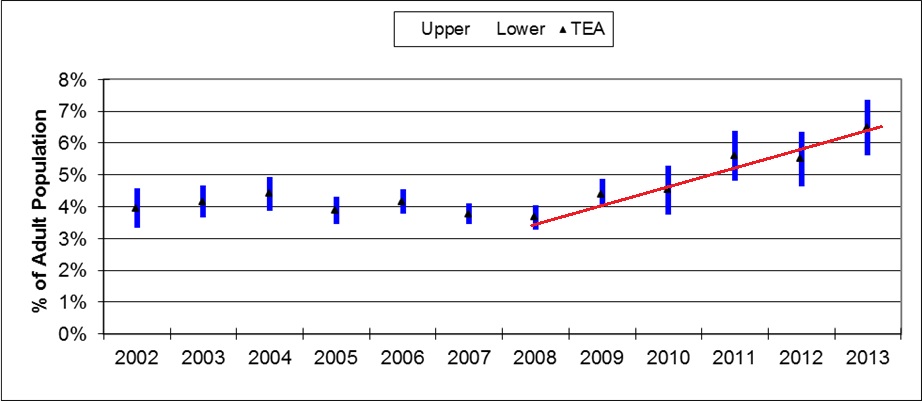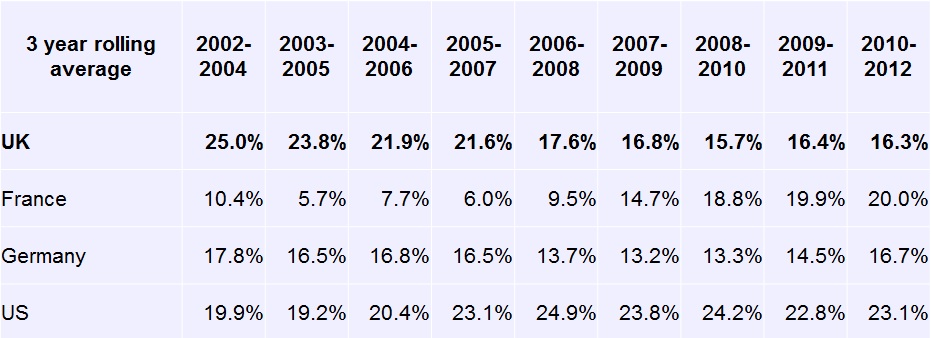Last month saw the release of the latest data from the Global Entrepreneurship Monitor, a major annual international survey of entrepreneurial behaviours and attitudes. What makes this dataset so powerful is the size of the sample (2,000+ people respond in the UK alone) and the fact that the data goes back over 10 years. It also has an extensive set of questions that touch on feelings and attitudes not covered elsewhere. So it’s worth a gander if you’re interested in enterprise, small business and other things of that ilk.
Here are three of the biggest insights from the 2013 results to be aware of:
#1 The overall level of entrepreneurial activity has dipped (for now)
The graph below shows the numbers of adults engaged in what is called ‘early-stage entrepreneurial activity’ (in other words, the number of start-ups). As you can see, the proportion of people in the process of starting a business fell quite sharply between 2012 and 2013, from around 10 per cent to just over 7 per cent.

Similar falls also occurred in other measures of entrepreneurial activity. For instance, the number of people who say they intend to start a business in the next three years fell by around a third. Yet one swallow doesn’t make a summer, and the 2013 figure remains above that seen in the early 2000s. Indeed, statistics from the Labour Force Survey (LFS) suggest that self-employment has continued to increase in the last year (and that the growth has even sped up).
It’s also worth noting that measures of ‘opportunity’ entrepreneurship (entrepreneurs who want to be in business) fell just as much as ‘necessity’ entrepreneurship (entrepreneurs who do not want to be in business). If the fall in entrepreneurial activity was mainly down to reluctant entrepreneurs returning to a typical job, we would have expected necessity entrepreneurship to have taken most of the hit.
#2 But new types of entrepreneurs are emerging
The average self-employed person is male and between the ages of 35-49. But that stereotype is being chipped away as several other demographic groups become more prominent. We know there has been a dip in entrepreneurial activity all round (see above), but three groups in particular appear to be better at weathering the storm.
The first is women. The graph below shows that while both male and female start-up rates have fallen since 2012, the latter has proven much more resilient. This is also borne out in data from the Labour Force Survey, which shows that the number of women in self-employment has increased by over 40 per cent since 2000, compared to 20 percent for men.

The second is older people. The graph below shows the proportion of 50-64 year olds who are engaged in any kind of entrepreneurial activity (the black arrow shows TEA i.e. those in the early stage of starting a business). As you can see, there has been a substantial increase in the last few years alone. I’m afraid I don’t have data for the over 65s, but the LFS statistics show a huge increase in self-employment among those in their retirement age.

The third group is young people. According to GEM, the number of young people in the early stages of starting a business has nearly doubled, moving from around 5 per cent in 2010 to 9.5 per cent last year.
#3 The number of high-growth businesses is atrophying
Ask any expert who knows something about entrepreneurship and they will say that the UK doesn’t have a shortage of start-ups. Rather, it has a shortage of scale-ups. The below table shows the number of firms in comparable countries that expect to create a large amount of jobs over the next 3 years. What is striking is that the UK has gone from the country with the highest proportion of high job expectation-firms to the country with the lowest. Whereas a quarter of our firms were once major job creators, now it is close to 15 per cent.

I hope that’s some food for thought. You should be able to find the full results of the Global Entrepreneurship Monitor survey on their website in the coming weeks. Thanks to Mark Hart of Aston University and his team for allowing us prior access to the data.
P.S. Keep an eye on this blog for the results of our own RSA/Etsy survey on microbusinesses, conducted in partnership with Populus.
The RSA and Etsy are exploring similar themes in a new project, The Power of Small.
Related articles
-
Alone together: Why it’s time the self-employed joined forces to overcome adversity
Benedict Dellot
Our new report with FSB calls for a movement of mass self-organising among the self-employed. Ben Dellot gives an overview of the report’s findings.
-
Collaboration no longer a dirty word for the self-employed
Mike Cherry
Following the release of our new report ‘The Self Organising Self-Employed’, FSB chairman Mike Cherry blogs on the importance of collaborative initiatives and what the Government can do to support them.
-
Why government needs to get serious about self-employment
Benedict Dellot
Our new report, The Entrepreneurial Audit, argues that paring back corporation tax and culling regulation are at best insufficient policy moves, and at worst damaging to the long-term interests of the business community.




Be the first to write a comment
Comments
Please login to post a comment or reply
Don't have an account? Click here to register.